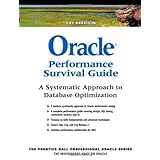
Average Reviews:

(More customer reviews)Mr. Harrison has been a respected author in this field for more than a decade. His writing back in the days of version 8 first opened my eyes to the world of Oracle performance tuning. When I learned that he published this new book, updated and greatly expanded in scope, I just had to read and devour it.
This book is an encyclopedic overview of all aspects of Oracle performance. Mr. Harrison takes a layered approach, starting at the top with application and data model design where the focus is minimizing the demand for database resources. He then moves down into database code internals, where the focus is maximizing concurrency through reduction of lock, latch, and mutex contention. The next step is to optimize memory usage to minimize the need for physical IO. Finally, he moves to the bottom layer, where the focus is on optimizing physical IO at the disk layer.
Each of these layers is worthy of its own book, so to combine all these topics in a single book is an ambitious goal. Indeed, experienced readers will often want a bit more detail, or wonder why their favorite optimization was not mentioned. However, Mr. Harrison strikes a very good balance between depth and coverage. He also provides a very useful bibliography, including the Oracle documentation, books, and Internet sites and blogs.
For each chapter, Mr. Harrison provides extraordinarily clear, concise, and helpful introductions and summaries. He also uses boxed borders to highlights particularly important points within the text. One can learn a great deal by simply reading these summaries and boxed items, and these can also be used to help the reader find relevant sections, which is especially valuable in a book of this length.
This book is not the last word on SQL tuning, optimizer internals, Oracle troubleshooting, the SGA, nor latch contention. However, its coherent approach, useful summaries and highlights, and efficient organization, make it a valuable and essential guide to anyone wishing to expand their Oracle performance skill set.
The target audience includes both application developers and DBAs. It covers 10g, 11g, 11gR2, with context from 8i and 9i.
Click Here to see more reviews about: Oracle Performance Survival Guide: A Systematic Approach to Database Optimization
Oracle Performance Survival GuideA Systematic Approach to Database OptimizationThe fast, complete, start-to-finish guide to optimizing Oracle performanceOracle Performance Survival Guide offers a structured, systematic, start-to-finish methodology for optimizing Oracle performance as efficiently as possible. Leading Oracle expert Guy Harrison shows how to maximize your tuning investment by focusing on causes rather than symptoms, and by quickly identifying the areas that deliver the greatest "bang for the buck."Writing for DBAs and developers with all levels of experience, Harrison covers every area of Oracle performance management, from application design through SQL tuning, contention management through memory and physical IO management. He also presents up-to-the-minute guidance for optimizing the performance of the Oracle 11g Release 2. You'll start by mastering Oracle structured performance tuning principles and tools, including techniques for tracing and monitoring Oracle execution. Harrison illuminates the interaction between applications and databases, guides you through choosing tuning tools, and introduces upfront design techniques that lead to higher-performance applications. He also presents a collection of downloadable scripts for reporting on all aspects of database performance. Coverage includes • "Tuning by layers," the most effective, highest-value approach to Oracle performance optimization • Making the most of Oracle's core tools for tracing, monitoring, and diagnosing performance • Highly efficient database logical and physical design, indexing, transaction design, and API use • SQL and PL/SQL tuning, including the use of parallel SQL techniques • Minimizing contention for locks, latches, shared memory, and other database resources • Optimizing memory and physical disk IO • Tuning Real Application Cluster (RAC) databasesguyharrison.netinformit.com/ph
